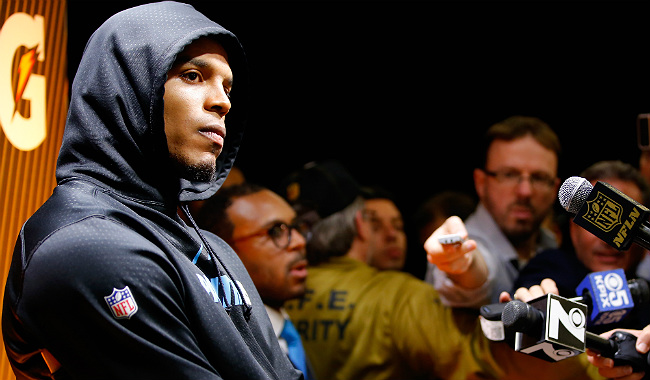
Writing about sports is an easy job. One of the times it can be difficult is if the players you want to write about don’t want to talk.
Cam Newton sat at a microphone after losing Super Bowl 50 for three minutes, didn’t really say anything, and then walked out of the room. He was pissy, pouty and I’m thinking those feelings had to do with the fact that he just lost the biggest game of his life, the game he had dreamed about since he was a kid, like 20 minutes earlier.
This, of course, brought about the takes. He should answer questions, stand up, be a leader, represent the league, represent the team, represent himself, do the part of the job that is engaging with the media, even if it’s really tough, all that crap.
Okay. Here’s the thing about this specific situation involving Cam Newton — anyone who tells you he did something terrible is either bad at their job or has become so entitled in their jobs that their opinion on this type of thing should not be taken seriously.
https://youtu.be/-H7t46cBCzc
Here’s a story about a time a player blew me off. I went to Boston. The Rangers were playing the Bruins on, I don’t know, a Thursday. On Wednesday, the Rangers were practicing. On Tuesday, I asked if Ryan Callahan would be available to talk after Wednesday’s practice. I was told yes. I told my editor a story about Callahan’s very good season would be on its way once I talked to him.
He blew me off Wednesday. I had no story. He eventually gave me time the next day, but on the day I had planned to have a conversation with him, it didn’t happen. I was screwed.
That’s different than what Newton did after the Super Bowl by a magnitude of 100.
If I’m working a Super Bowl and I want to write a Cam Newton story, I know that after the game, he’s not a dude I’m getting 1-on-1. He’s going to speak at the podium, because he’s the best player on the team and it will be impossible to accommodate the media in such a small space, so he will go to the press conference room with the cameras and microphones. I know this as I’m riding the elevator downstairs.
In the Panthers locker room, I will ask teammates about Cam. Eventually, Ron Rivera will step to a microphone and I can ask him about Cam. Someone else in that press conference will also probably ask about Cam.
As someone writing a postgame story about Cam, I will talk to as many people as I can about Cam.
I don’t need Cam.
Do I want Cam? Oh sure. But after a game, in order to write about Cam’s game, Cam talking is not a requirement to do my job. He could sneak out the backdoor of the stadium and it does nothing to impede my job. But here’s the thing:
He went to the podium! He talked! He didn’t say much, but he talked! He gave you three minutes of raw, pissed off, emotional stuff. Did he give you a 100-word quote that gets you 1/10th of the way to your 1,000-word column? No, but he gave you something real, which you should appreciate a hell of a lot more than platitudes about working hard, being outplayed, building for next year, blah blah blah. That stuff is the worst. As a reporter, that should be the last thing you want.

If Cam did this after every game, would this be a problem? Yes. But he just lost the Super Bowl. This is him in his most honest form. Embrace that. Write about that! That should be what you want! By all accounts, he’s been out in front of the media all season, so it’s not like this is a pattern with him.
Some people say athletes owe the media nothing so they have no right to complain. I partially disagree with that. I think it’s part of the job. I don’t think Cam or any player needs to talk to the media every day, but there needs to be some sort of interaction. Some people don’t feel that way and I get it. I look at the relationship between media and athletes like the relationship between co-workers in different departments of a company. No one is saying everyone needs to hang out all the time, but there should be some level of cordialness if someone needs to talk to someone in another department. We’re talking about five minutes of your day.
My problem is with the people who are mad at Cam not because his attitude ruined a story, but because they feel he is under an obligation to speak and did not do so and the media is entitled to an athlete whenever they want them. If you asked 10 media types who are pissed off at Cam, I bet eight are mad simply on principle (if you can call it that) and two are mad because they really wanted to hear his thoughts on something and are upset because it would have been the heart of their story. I’m sorry for those two people, but I assure you his three minutes of non-answers are better than 10 minutes of polished ones.
I don’t need Ryan Callahan after a game. Ever. He could score two goals in a 2-1 win and I can talk to other people about him and write it that way.
But Cam did more than that. He didn’t skip out. He showed up, gave real answers and left. He gave you a story. If you’re pissed off because it wasn’t the story you had pre-written before you went to the locker rooms, that’s a you problem, not a Cam problem.
(This post originally appeared on Dave Lozo’s Tumblr)






